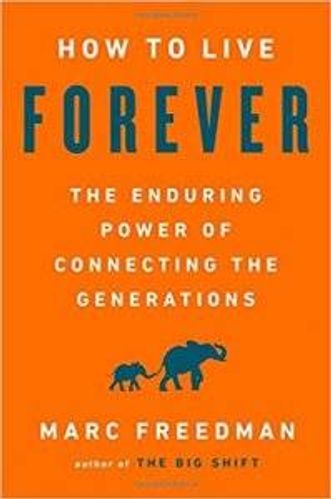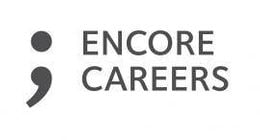Here's How to 'Live Forever'
The Encore.org CEO on his new book about connecting with younger people
Marc Freedman, the president and CEO of Encore.org who coined the term “encore career” has just written a book, How to Live Forever: The Enduring Power of Connecting the Generations (Public Affairs/Hachette). Here, Encore.org talks with him about why, and how, older Americans should invest in, and connect with, the next generation.

Encore.org: America is becoming an older nation. Does that worry you?
Marc Freedman: In 2019, for the first time, there will be more Americans over 60 than under 18. For a country that’s always thought of itself as young, that’s a shock to the system! We’re now a more-old-than-young society and with that comes the fear of scarcity, isolation, cost and conflict.
I hope we never see “kids vs. canes,” but the possibility of a struggle over diminishing resources in a society split along generational lines is real.
And yet How to Live Forever is a deeply optimistic book.
I don’t want to make light of the genuine challenges we face, but I believe there is reason for optimism and the possibility of a much better outcome.
The fact is, for all the hand wringing and apocalyptic predictions, the needs and assets of the generations fit together like pieces of a jigsaw puzzle. Just ask any grandparent! If we build on this natural bond between the older and younger generations, both within families and across different communities, we can avoid conflict, solve problems from child care to loneliness and even generate a good deal of personal happiness along the way.

What prompted you to write this book?
Turning 60 had something to do with it, but, really, it was a movie that pushed me to write How to Live Forever.
Keep On Keepin’ On, a documentary released in 2014, follows the relationship between jazz great Clark Terry, who is in his 80s, and Justin Kauflin, a blind piano prodigy in his 20s. When Clark began to lose his sight to diabetes, a student introduced him to Justin. That meeting led to an extraordinary friendship — and a two-way mentoring relationship. Over the years, Clark taught Justin everything he knew, and Justin gave Clark a reason to live and a way to live on.
To this day, the film has a deep emotional hold on me. It captures so many important lessons about how to nurture the next generation. I think about it all the time.
Can you explain the book’s title?
I’m appalled by the Silicon Valley tech titans who are investing millions in plans to radically extend life and even eliminate death entirely. Real happiness and understanding begin not with denying or defeating death.
The only true way to endure is to accept our mortality and with it the wisdom that we are a species designed to live on...just not literally. We do so by passing on, from generation to generation, what we’ve learned from life.
By investing in and connecting with the next generation, not actually trying to be that generation. That’s how we live forever.
What’s standing in the way of closer ties between older and younger generations?
Since the beginning of human history, older people have invested in and supported younger generations. And yet over the past 50 years, we’ve taken something that’s deeply rooted in the human experience and made it close to impossible in our modern world.
The two biggest culprits are a culture that encourages older people to hang on to their youth and a whole set of institutions that keep the generations physically apart. Workplaces, housing and our education system are all increasingly age-segregated.

What will it take to remove the barriers and bring the generations together?
We’re going to have to be as creative at inventing institutions that bring Americans together as we have been over the past century in crafting ones that split us apart.
I’m encouraged by new ideas popping up across the country, particularly in housing.
A few years ago in Boston, two MIT grads launched Nesterly, a tech start-up pairing older people who have room to spare in their homes with university students in need of reduced rent and able to do chores. In Cleveland, a senior living community called Judson Manor created an artist-in-residence program in 2010 providing free housing for graduate music students, who agree to perform for the residents and participate in meals and other activities.
In both cases, proximity has often brought with it not just support but deep, intergenerational friendships.
How can we age-integrate education?
There’s so much happening in education. AARP Experience Corps brings older adults into urban elementary schools to tutor and mentor about 30,000 K-3 students each year — with proven benefits for kids, older adults and school cultures.
The Encore STEM Teachers program is working to age-integrate the teaching profession in California.
And a series of programs in the U.S., at Harvard, Stanford and the University of Minnesota, designed to help people over 50 find encore careers, are beginning to age-integrate higher education. The older students take most classes alongside their younger counterparts, bringing real-life perspective to class discussions.
What about the workplace?
To bring a new source of experienced talent to the workplace, we’ve created Encore Fellowships for people finishing up their midlife careers and looking for high-impact, paid assignments in the social sector, where they can learn and contribute their skills and knowledge to a cause. Think Robert De Niro’s character in the movie, The Intern.
Encore Fellows get a bridge from a midlife career to a more lasting encore, and the nonprofits get the benefit of skills honed for decades in corporate life, plus a taste of the value of a multigenerational workforce.
What can we do to challenge age segregation in our own lives?
It’s so important to focus on creating relationships across generations. But don’t do it in an eat-your-broccoli kind of way. Do it because it’s one of the surest routes to happiness in our longer lives.
The psychiatrist George Vaillant, who led the landmark Harvard Study of Adult Development, tracking hundreds of men for decades, found that those in middle age or older who invest in nurturing the next generation are three times as likely to be happy as those who fail to do so.
How to get started? Here are three quick tips One; Think long and hard about how you set up your life — where you live, worship and volunteer. Two: Listen. One of my mentors used to talk about how easy and seductive it is to be interesting. It’s much harder but more worthwhile to be interested. And three: Sign up for more ideas from Gen2Gen, the Encore.org campaign to mobilize 1 million adults 50+ to stand up for — and with — young people today.
Of all the things that divide us, the gap between old and young is arguably the most bridgeable, but there’s no time to waste.


